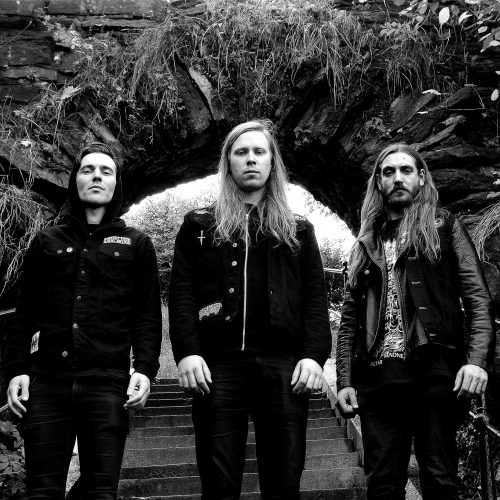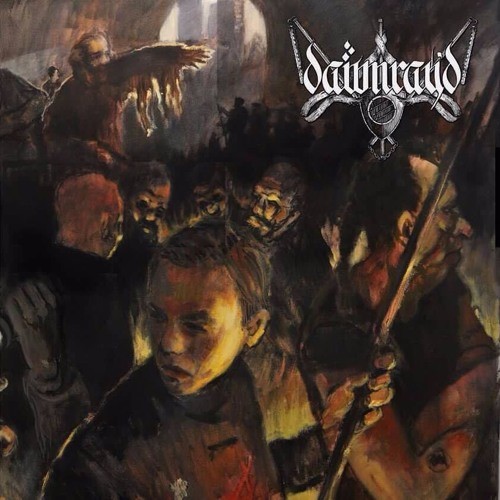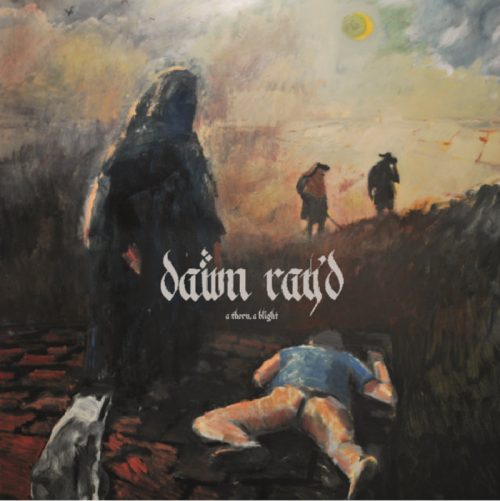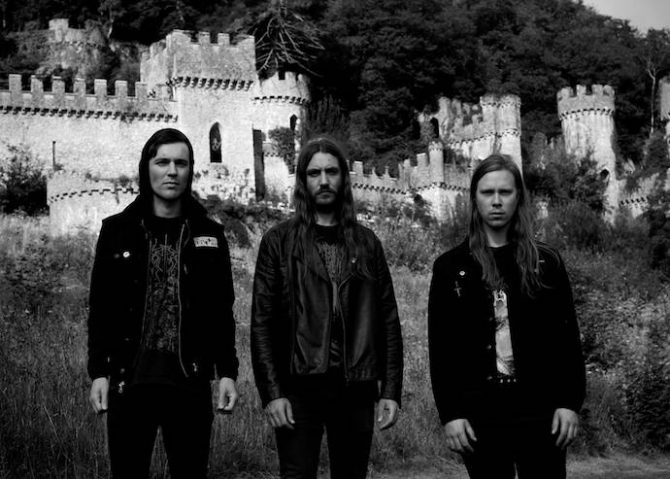(In this week’s edition of Waxing Lyrical, Andy Synn posed questions about lyrics to Simon Barr, vocalist of one of our own favorite bands, Dawn Ray’d.)
We’ve been fans of UK Black Metal three-piece Dawn Ray’d for a long time now, ever since we stumbled across their debut EP, A Thorn, A Blight (which I reviewed, eventually, a little under a year after it came out).
Mixing politics and passion, searing social activism and savage blackened invective, the band’s follow-up full-length, The Unlawful Assembly, quickly became one of the best-received and best-reviewed albums of last year (including here at NCS), which is why I’m pleased to have been able to corral the band’s vocalist (and occasional violinist) Simon Barr for this latest edition of Waxing Lyrical.
Beginnings…
All 3 of us used to play in another band called We Came Out Like Tigers, which, although genre-wise was a very different band, had a lot of similarities too. It had a strong focus on the lyrics, so when we started Dawn Ray’d we all knew already what each person would contribute and what our strengths were.
One difference between our two bands is that I do all the vocals in Dawn Ray’d; there aren’t any backing vocals or guest vocals, which means I write all the lyrics. That said, a lot of things that we talk about as a band make their way into the songs; discussions about philosophy and anarchism for example, or our own takes on current events and conflicts.
This is important to me, as I think the lyrics often reflect the 3 of us, rather than it being some esoteric monologue from me!
We sing about some quite intense political ideas too, which means it is crucial we are all ok with the themes covered in the lyrics.
Inspirations…
I don’t really have a set formula for writing lyrics, but one thing I have to do is read as much as I can. I mostly read modernist poetry like TS Elliot, WH Auden, and Walt Whitman, some more radical poets like Voltairine De Cleyre and Yannis Ritsos, and some more recent poets like Sharon Olds, Michelle Cahill, and John Burnside.
I really don’t like poetry that rhymes. I think the odd rhyme in a song can be satisfying, but on the whole I see it as an odd novelty that just puts a needless constraint on the quality and clarity of your writing.
I read some prose as well; William Golding is super-descriptive and so is Graham Greene, but on the whole I prefer poetry as it is so direct and densely packed, not a single word is wasted, there is no filler.
I also constantly write down lines and phrases that sound nice even if they don’t immediately have any meaning, and they can act as a starting point or a way to set the mood of a song. I aim to write poems but settle at them being songs!
Metal is an interesting genre to write lyrics for, it has quite a strict set of constraints and parameters that you have to stick to, which I find to be a good challenge. I aim to write about anarchism and the world around me, but in an imaginative and poetic way that isn’t dry (like so much political music can be!). That’s what I aim to do at least…
Influences…
There are a few lines from various places that I have floating round my head at any given time, bench marks to aim at. My favourite ever is from “Four Quartets” by TS Elliot; he sums up the importance of living in the present and that we only have the present with the line
“at the still point, there the dance is”
I love that line, for me it is a perfect philosophy on how to live your life, the future and the past are unattainable, the only beauty and happiness is in the here and now.
Another literary quote I always think of is from “Brothers Lionheart”, a Swedish children’s fantasy story by Astrid Lindgren;
“there are things you have to do, otherwise you’re not a human being, just a piece of dirt.”
I really like that line a lot. It doesn’t really inspire the actual wording of songs for me, but keeps me on the right path politically.
Singing about anarchism in a scene that has a lot of very conservative political views can present its own challenges, and not everyone likes us doing that, but speaking out for the most marginalised and oppressed sections of society is the moral thing to do. Lines like that remind me that it might not be the easiest or most popular path to take, but it’s the right thing for me personally. (Not everyone sings about politics, and that’s fine too! I love songs about fantasy as much as anyone.) I was discussing this with a friend who plays in Queen Zee, they sing about trans* issues a lot and get some stick for it from conservative boneheads. They said that they “get shit for it so other queer and trans kids don’t have to.” That stuck with me in the same way.
Song-wise, you are often restricted to bands that have audible lyrics. Savage Family are an indigenous hip-hop collective from Turtle Island (otherwise known as USA), they sing exclusively about the struggles of native peoples and the great wrongs committed by colonial settlers. They talk about revenge a lot, which is a very important subject I think. There is a line in their song “Warmask” which is:
“I’d be ashamed to forgive this,
there’s things they did that weren’t made for forgiveness.”
That is such an impressive line, and the power and malice of it gives me chills every time I hear it.
Propaghandi have been mentioned before in this series, but they have such good lyrics, and I love the line
“how does it make you feel to know that you voted for this?”
As an anarchist I do not support the rule of a government or king, and to vote for the lesser evil in an election is still a vote for a tyrannical government that will uphold capitalism, terrorize working class communities, destroy the environment, and never work in ordinary people’s best interests. These are ideas that even liberals struggle with, so to be so blunt and direct about the failures of voting is awesome I think.
Changes…
Dawn Ray’d has only released an EP/demo and one full-length, but I have definitely seen changes in my approach between those 2 records. For shorter releases you can just write whatever comes into your head or comes naturally, as you don’t need that much material, but for a full-length I had to write 10 full songs, which is a lot. I had to be quite methodical and structured about it, and try and map out where the record would go, something I’ve never done before.
I decided on specific struggles I wanted to address and would dedicate a full song to each, and try not to cover too much ground in each song. I wanted to look at aspects of those struggles thoroughly, so it was important to be focused. I have also had to be strict about what not to include; I’ve written a ton of personal stuff that wouldn’t really be suitable for Dawn Ray’d.
I’ve definitely found a framework of sorts. I try and know what I’m going to write about, then use some more imaginative metaphors and imagery to describe it. I could have probably done that a bit more on A Thorn, A Blight; I’ve got better at being less literal and more image focused, so as not to lose that sense of atmosphere or any of the underlying magic of Black Metal.
Something old…
The song “At The Still Point” (the title should be familiar by this point in this piece…) is about struggling with your emotions in winter, and feeling really helpless in your fight against it.
I think on reflection I wasn’t feeling very in control of my life in general at the time. I’m still really pleased with this song:
Another morning in tears,
The piano hammers out.
You catch yourself absconding with
All the world’s heavy truths,
To flirt with the foolish optimism that
Is the start of winter.
Drunken absurdities:
‘it will be romantic,
There is beauty in the cold!’
There is not,
And it will try and kill us.
That is a truth that all the trees know.
We stray too far from the sun,
The Earth strains at its tether.
It was very inspired by all the poetry I was reading at the time. I tried to just give a snapshot of that feeling, no introduction and no conclusion. The line “it will try and kill us, that is a truth that all the trees know” is the one I’m most proud of. It was meant in reference to the trees shedding their leaves each winter and seemingly dying off or shrinking away to try and survive the cold. “We stray too far from the sun, the earth strains at its tether” is also a nice line I think, that feeling of being dangerously miserable or lost in the darkest, most miserable parts of the year, and not seeing any way out of it.
Something new…
I decided as much as possible on our latest record to sing about political or social themes, and to write less personal songs. There is no clean break between the personal and the political though, and the best political songs are often about someone’s personal and emotional struggle. I think the song I’m most happy with on The Unlawful Assembly is “The Abyssal Plain”.
It is all based on discussions me and my closest friends have had about why we continue to be anarchists and activists, even in the face of great adversity or a future that looks more and more bleak. I was trying to decide if it was my experience of how amazing anarchism works in practice in communities, or my anger at how awful capitalism is, that keeps me wanting to change things. I decided it was probably both, which I hope comes across in the closing lines:
“For all the times we’ve been sold out,
For all the land that’s been let down,
For all the families poverty drowns,
Let the shadows grow!”
The shadows are the resistance, those who are criminalised, the enemies of the rich and the powerful. I wanted to convey those ideas but in a more beautiful and imaginative way;
“The insipid glare of orthodoxy,
Conformities’ unforgiving spotlight
Chases magic to the perimeter line,
Leaving darkness as our only adventure.”
Life under capitalism is drudgery. Not only is it exploitative, but there is no place in it for true adventure, true romance, true community. How many musicians are there who will never be able to release a record because they can’t afford to? Is it a coincidence that such a high percentage of successful musicians went to private school?
I wanted to be more direct on this album, and for it to be a rabble-rouser of a record. It is less whimsical for sure, which is not necessarily an improvement, but it was conceptually what I felt our first full-length needed to be!
And finally…
The best way to write is to read I think, and the best way to write music is to listen to music. To quote TS Elliot one final time:
“One of the surest of tests is the way in which a poet borrows. Immature poets imitate; mature poets steal; bad poets deface what they take, and good poets make it into something better, or at least something different.”




